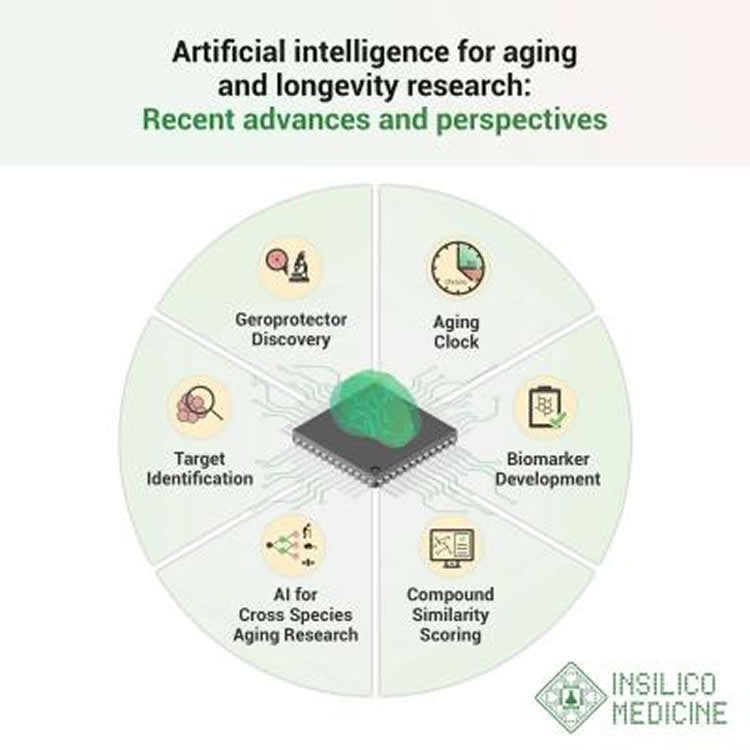Summary: Researchers report artificial intelligence advancements may help to personalize immunotherapies and slow the effects of biological aging. l genes associated with Parkinson’s disease, a new study reports.
Source: Insilico Medicine.
Insilico Medicine, one of the leaders in artificial intelligence for drug discovery, biomarker development, digital medicine, and aging research announced today the publication of its recent paper titled “Artificial Intelligence for Aging and Longevity Research: Recent Advances and Perspectives” in Ageing Research Reviews, one of the highest-impact journals in the field. The paper introduces recent advances in deep learning for aging research and provides fair insight into the field.
The emergence of the longevity biotechnology industry has brought many biotech and pharma companies and academic research institutions to the longevity landscape, and now one of the key trends accelerating the field is recent advances in artificial intelligence.
“Insilico Medicine is dedicated to extending human longevity. We came up with several very important realizations. First, age is one of the most abundant biological features, and when your data looks like Swiss cheese, age is present. Second, Deep Learning (DL) age predictors are a great way to integrate previously incompatible data types, such as videos and blood test results. Third, the generation of new biological data using Generative Adversarial Networks (GANs), with age as a generation condition, is a great way to produce high-quality synthetic data.
Also, it is possible to view aging as a staged disease to get a holistic view of the biological process on both tissue-specific and systemic levels, which makes the Deep Neural Networks (DNNs) more interpretable, builds causal graphs, and identifies biological targets.

Moreover, it is possible to train the DNNs on age and retrain the model on specific diseases. Also, it is possible to use biological aging clocks to personalize immunotherapies and vaccinations and to identify new ways to improve response rates.
The paper outlines these realizations and presents a way to accelerate aging research using AI technologies”, said Alex Zhavoronkov, Ph.D., founder and CEO of Insilico Medicine, who led the study.
Source: Qingsong Zhu – Insilico Medicine
Publisher: Organized by NeuroscienceNews.com.
Image Source: NeuroscienceNews.com image is credited to Insilico Medicine.
Original Research: Open access research for “Artificial intelligence for aging and longevity research: Recent advances and perspectives” by Alex Zhavoronkov, Polina Mamoshina, Quentin Vanhaelen, Morten Scheibye-Knudsen, Alexey Moskalev, and Alex Aliper in Ageing Research Reviews. Published November 2018.
doi:10.1016/j.arr.2018.11.003
[cbtabs][cbtab title=”MLA”]Insilico Medicine”Artificial Intelligence Tracks Biological Age and Helps Rewind the Aging Clock.” NeuroscienceNews. NeuroscienceNews, 3 December 2018.
<https://neurosciencenews.com/ai-biological-aging-120189/>.[/cbtab][cbtab title=”APA”]Insilico Medicine(2018, December 3). Artificial Intelligence Tracks Biological Age and Helps Rewind the Aging Clock. NeuroscienceNews. Retrieved December 3, 2018 from https://neurosciencenews.com/ai-biological-aging-120189/[/cbtab][cbtab title=”Chicago”]Insilico Medicine”Artificial Intelligence Tracks Biological Age and Helps Rewind the Aging Clock.” https://neurosciencenews.com/ai-biological-aging-120189/ (accessed December 3, 2018).[/cbtab][/cbtabs]
Abstract
Artificial intelligence for aging and longevity research: Recent advances and perspectives
The applications of modern artificial intelligence (AI) algorithms within the field of aging research offer tremendous opportunities. Aging is an almost universal unifying feature possessed by all living organisms, tissues, and cells. Modern deep learning techniques used to develop age predictors offer new possibilities for formerly incompatible dynamic and static data types. AI biomarkers of aging enable a holistic view of biological processes and allow for novel methods for building causal models—extracting the most important features and identifying biological targets and mechanisms. Recent developments in generative adversarial networks (GANs) and reinforcement learning (RL) permit the generation of diverse synthetic molecular and patient data, identification of novel biological targets, and generation of novel molecular compounds with desired properties and geroprotectors. These novel techniques can be combined into a unified, seamless end-to-end biomarker development, target identification, drug discovery and real world evidence pipeline that may help accelerate and improve pharmaceutical research and development practices. Modern AI is therefore expected to contribute to the credibility and prominence of longevity biotechnology in the healthcare and pharmaceutical industry, and to the convergence of countless areas of research.






